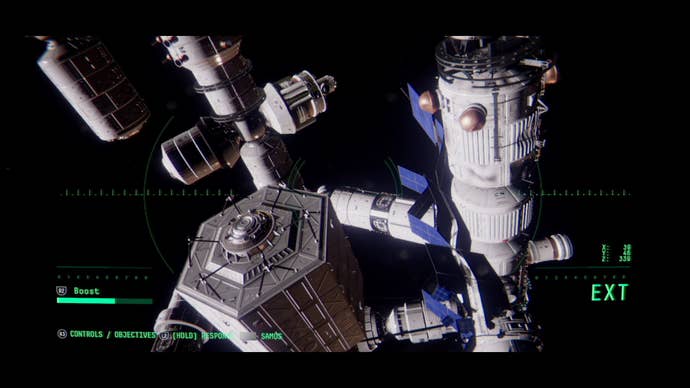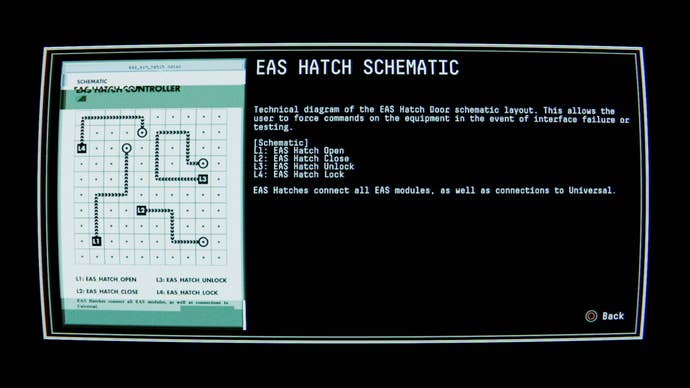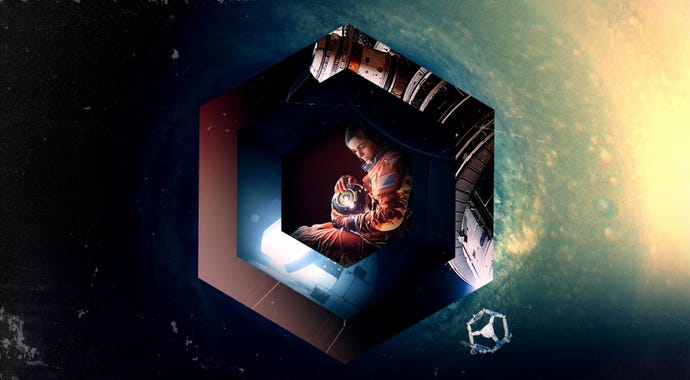Observation Review
An eerie space station adventure that's derailed by some questionable design decisions.
This article first appeared on USgamer, a partner publication of VG247. Some content, such as this article, has been migrated to VG247 for posterity after USgamer's closure - but it has not been edited or further vetted by the VG247 team.
There's nothing quite like a good abandoned space station. Event Horizon did the creepy as heck abandoned space station well, and Dead Space did it even better. Maybe I'm so fascinated and drawn to abandoned space stations because they're often detached from reality, presenting boundless opportunities for storytelling. Observation takes full advantage of the setting and puts a little twist on it, throwing you into the digital boots of S.A.M., an A.I. computer system.
As S.A.M., you have access to all the ship-wide cameras, patrolling the hallways of the desolate space station as an unseen presence through technology. But Observation isn't about the all-seeing, all-knowing S.A.M. Developer No Code deftly avoids one cliche by placing the focus of Observation firmly on the sole survivor of the space station: Emma Fisher. There's no ruminating over A.I. sentience or the power that computers hold in Observation, and it's all the better for it.

Observation is a puzzle game at its core. It's one that carries a vibe and aesthetic similar to that of 1979's Alien, with murky, dimly lit corridors leading to terminals and hatches that you need to manually enable and disable yourself. While the UI of Observation feels akin to that of the doomed Nostromo, the score feels like a blunt assault on your ears, not unlike that of Blade Runner: 2049. Like synthetic waves crashing over your head, the score of Observation feels beautiful yet unfocused, and entirely vanishes when it chooses to, leaving you in eerie silence broken only by the beeps and boops of computer terminals.
As S.A.M. the A.I., you spend your time diligently repairing the space station. There are no map markers to help you, and your only guidance comes in the form of instructions from Emma. You might be told to "head outside and inspect exterior damage" to the station, but how you get outside the station, and where to inspect that damage, is all left up to you.

The gameplay "loop" of Observation is incredibly hard to describe because it's one that's actively changing as you progress through the game. The challenges of Observation can range from simple memory puzzles to finding schematics scattered around the ruined station to unlock doors and computers. Because of the changing nature of the puzzles, making solid progress in Observation is incredibly difficult; you're constantly being hamstrung by new types of puzzles to overcome.
Observation feels like you're actively fighting against the space station, as though you're trying to bring the debris and chaos around you under your control. This sense of struggle feels thematically appropriate for a broken space station in disrepair, but there's no denying that it makes for a frustrating experience. Using my very incapable mind to control a very capable A.I. makes me think that Emma Fisher probably spends half the game wondering, "What the hell is wrong with this robot, and why is it taking so long to open a door?"
No Code is purposefully ambiguous in its storytelling. The humble beginnings of a stranded space station give way to something far more complicated and mysterious. Twists in the plot come thick and fast from as little as 10 minutes in, but Observation doesn't feel any need to answer the vast majority of the questions that it raises. Like abstract art, Observation's very nature is designed to have you consider what you're seeing.
"What does it all mean?" will be a common question by the end of Observation. Yes, it's frustrating to have so many questions unanswered and mysteries unsolved by the conclusion of the game, but it's also a conclusion that's dragged out a bit much to really make it impactful. There are a handful of occasions where Observation could have wrapped things up, any of which would have left me more on the edge of my seat and desperate for answers than the actual ending did.
I'm not entirely sure that I can recommend Observation, given its core nature. Observation is a game that's constantly fighting against your progress, tripping you up with changing challenges and a lack of direction in its commands. It's a constantly evolving and changing puzzle game yes, but there's no clear path or logic in the evolution of the puzzles, so it's incredibly difficult to tackle new tasks when your past experience counts for very little. Observation is a thematically gripping story, burdened by frustrating puzzle mechanics and a lack of any closure.
ConclusionObservation has no trouble grabbing you from the go, with gripping central mysteries and questions that demand answers. Painstaking progress through even the simplest commands and instructions counteract any sense of progress in Observation, and ultimately dilutes and cheapens the experience.


